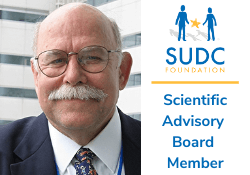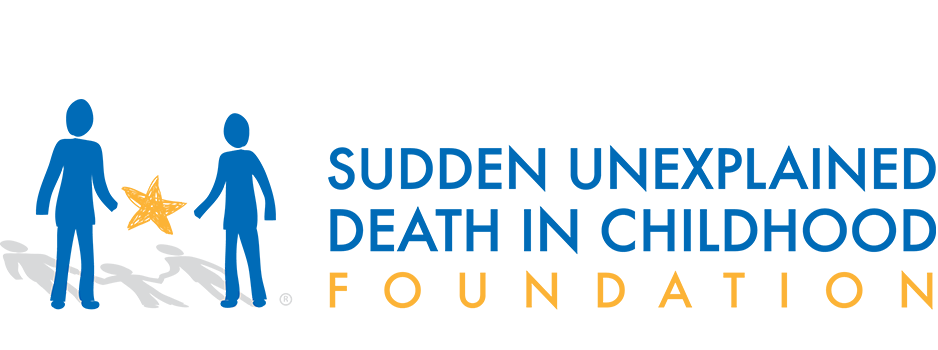19 May Scientific Advisory Board Spotlight: Dr. Thomas Keens

In this edition of SUDC Insights, we would like to introduce you to one member of our Scientific Advisory Board, Dr. Thomas Keens. Dr. Keens is a pediatric pulmonologist, Professor of Pediatrics, Physiology and Neuroscience at Keck School of Medicine at the University of Southern California and serves as the Chair of the California SIDS (Sudden Infant Death Syndrome) Advisory Council.
The SUDC Foundation Scientific Advisory Board was created to influence the priorities of SUDC resources to address the Foundation’s mission, the accurate dissemination of information regarding SUDC and provide scientific expertise to benefit the SUDC cause. The board is made up of researchers, clinicians and medicolegal death investigative professionals. These professionals offer advice and provide expertise in areas related to achieving the mission of the Foundation and helping to serve the needs of the SUDC community.
We are thankful to Dr. Keens for lending his expertise to advance the cause of SUDC!
What is your area of expertise?
I am a pediatric pulmonologist, with a focus on respiratory control disorders, which includes SIDS, and by extension SUDC. I am also board-certified in pediatrics and neonatal-perinatal medicine, though I am no longer an active neonatologist.
What is your professional background?
I graduated from St. John’s College in Santa Fe, New Mexico with a B.A. in Liberal Arts in 1968 and the University of California, San Diego, School of Medicine in 1972. I completed a pediatric internship and residency at Children’s Hospital Los Angeles in 1975 and a postdoctoral fellowship in pediatric respiratory physiology at the Hospital for Sick Children, University of Toronto Faculty of Medicine in Toronto, Ontario, Canada. It was at Sick Kids that I studied under the mentorship of the great respiratory physiologist, A. Charles Bryan, M.D., Ph.D. He was a pioneer in pediatric respiratory control, and other aspects of respiratory physiology in children, and especially in infants. I returned to Children’s Hospital Los Angeles in 1977 as an Assistant Professor of Pediatrics at the University of Southern California (USC). Serendipity has shaped my career. We had an infant with a rare respiratory control disorder, Congenital Central Hypoventilation Syndrome (CCHS), who did not breathe when he went to sleep. He became the first child we sent home on mechanical ventilation. At the same time, researchers believed that SIDS was caused by apnea (stopping breathing during sleep), and so caring for our CCHS infant and my training with Charlie Bryan catapulted me into a career caring for infants at increased risk for SIDS. We did some of the first research studies on arousal as a potentially protective response to dangerous situations during sleep. With time, I advanced through the academic ranks to become a full Professor of Pediatrics, and also of Physiology and Neuroscience at USC. My work with SIDS expanded, and I have been the Chair of the California SIDS Advisory Council, which is legislatively mandated to advise the California Department of Public Health on SIDS issues, since 2008. In this role, I have been a fierce advocate for SIDS families and promoting SIDS public education and research.
I first became involved with SUDC in the early 2000’s when Professor Henry Krous asked me to join his SUDC research project in San Diego as a pediatrician with expertise in clinical signs and symptoms of respiratory problems. This opened my eyes to SUDC. I was asked to join the SUDC Medical and Scientific Advisory Board in 2014, where I proudly serve.
In what ways have you helped the SUDC Foundation as a member of the Scientific Advisory Board?
I have responded, whenever I have been asked, to provide information about clinical issues with SUDC subsequent siblings and a few other areas.
What is one thing you wish fellow medical professionals understood about SUDC?
First, that SUDC exists. SUDC, like SIDS, probably represents a number of disorders, as yet undetected. However, they are natural disorders which can result in sudden death. Parents should not be blamed. Rather, support is needed to educate families experiencing an SUDC death so that guilt does not overcome and complicate grief. Research is marching on for SUDC, and it is important that this keeps going.
After your years of experience, what advice do you have for families who suffer an unexplained sudden death today?
The sudden and unexpected death of an infant or child of any age is a tragedy beyond what most of us can imagine. I am not a SIDS or SUDC parent, so I am not going to try to tell you how you feel or how you should feel. However, even as a physician, who has cared for many SIDS and some SUDC children, in the final analysis, the absence of any explanation for how your child died leaves one empty and unfulfilled. While knowing the cause of death will not bring your child back, being told that your child died, but we don’t know why, is no answer at all. In the absence of a known cause of death, there is a tendency for SUDC parents to search their child’s life, what the parents did and did not do, and ask if there is anything they did to cause the death, or anything they could have done to prevent it. Based on our current knowledge, SUDC deaths are not predictable and not preventable. There is nothing you did to cause it, and there is nothing you could have done to prevent it. Guilt complicates grief. So, as best you can, I urge you to forgive yourselves, and do not carry around guilt over what might have been. SUDC cannot be predicted or prevented, and you could not have prevented your child’s death.
There is one more issue, more likely in SUDC deaths than in SIDS deaths, and that is the possibility that your child died from an inherited disorder, which might affect other members of your family. It is prudent to have a frank discussion with your child’s pediatrician or health care professional to ask if other family members should be tested for things like cardiac arrhythmias, cardiomyopathies or other issues. A history of febrile convulsions in the SUDC child or family may prompt a neurologic evaluation. In many states, newborn screening will have ruled out many metabolic disorders. There is no cookbook answer to this question. Whether to pursue family testing, and what tests to take, should be guided by a careful medical history of your SUDC child, family history and autopsy findings. Your child’s pediatrician may not have much experience or knowledge about SUDC, in which case consultation with the SUDC Foundation would be helpful. We don’t think inherited disorders are common in the families of most SUDC children, but most have not been tested, so we don’t really know for sure.
What is a fun fact or something people might be surprised to learn about you?
I am an amateur magician. I was able to test in as a magician member of the world-famous Magic Castle in Hollywood. I also sing as a baritone in our church choir, and we have performed a number of concerts.
To see a full list of members of the SUDC Foundation Scientific Advisory Board, please visit https://sudc.org/board-of-directors.


